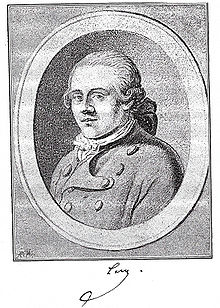The country preacher
The country preacher is a story by Jakob Michael Reinhold Lenz , which was written in Emmendingen in the winter of 1776/77 . Heinrich Christian Boie had the story printed in three consecutive issues of his magazine Deutsches Museum in mid-1777 .
Johannes Mannheim, pastor of Großendingen, proclaims a different kind of church teaching on Sunday . He mixes spiritual and economic matters.
content
Johannes Secondus, from his father, the o. G. Raised pastor, rises to extraordinary envoy of the States General and honors his deceased parents in many ways. One is the publication of the two-volume story of the life and deeds of his father, written by the latter himself during his lifetime. The first-person narrator combines this extensive work, published in Amsterdam, into the present short narrative :
Johannes Mannheim is sent to the university by his father, a Thuringian clergyman. In the university town, the student rents in the house of a venerable royal bailiff with many children. That official owns an estate. In addition to studying theology, the bailiff introduced the young student to the economic sciences there in the country . Later, the budding young theologian takes a closer look around the world; travels to French-speaking Switzerland and stays in England for a long time. Back home, he wants to free Mademoiselle Susanna Luzilla Bulac - his first love. The young lady, daughter of the provost of his father, is now awarded.
Johannes Mannheim got a mediocre job as a village pastor . He gathers the most respected citizens of the village and discusses obstacles to their construction of goods and other economic matters with them . After all, the pastor runs an estate with one of the wealthiest citizens of his village and - thanks to his practical skills - becomes wealthy in the process. A housewife is needed. Johannes Mannheim remembers the venerable bailiff. He still lives - a long day's journey from the village - in the university town. After some back and forth, Johannes Mannheim wins the love of the lovely young bailiff's daughter Albertine. The marriage is happy. From it emerges Johannes Secondus.
Successfully, with a happy hand and a dexterous tongue, the pastor helps to close the sad gap between the two estates, the rural nobility and the noble bourgeoisie . In addition, Johannes Mannheim grants asylum to many artists and scholars in his home. So in a certain way an academy of arts and sciences arises in the village . They put on comedies and go on pilgrimages to the neighboring mountains. The pastor and his wife Albertine want to write novels and forge verses. The couple denied this ambition, just as the pastor quit smoking tobacco and the pastor quit drinking coffee. After the couple's death, the son Johannes Secondus finds some excellent tracts - heirlooms - from the pen of the blessed father.
reception
- Voit remarks that the pastor and farmer Johannes Mannheim designed the work in his village according to “ socially utopian ideas of bourgeois public education ”. On the eve of the French Revolution , Lenzen's pastor put a snooty “gentleman from the court” in his place.
- When Voit writes about the author's prose, “Lenzen's often emphatic style is no longer there”, this is particularly true of the end of the story, which slips into a fairy tale.
- Voit attests to the author's creative power and highlights as an example the passage in which Johannes Mannheim visits his childhood sweetheart Luzilla.
- In the story, Lenz deals with his esteemed father, a respected preacher. This “last major work” of Lenzen was also “the last bold draft” of the poet “into the future”.
literature
- source
- Friedrich Voit (ed.): Jakob Michael Reinhold Lenz: Stories. Zerbin. The forest brother. The country preacher . Pp. 68-122. Reclam Stuttgart 1988 (edition 2002). 165 pages. With notes (pp. 125–141) and an afterword (pp. 147–165), ISBN 3-15-008468-7
- First edition
- Text of the story: Deutsches Museum 1. Volume, 1777, pp. 289–307, pp. 409–439, pp. 567–574 ( ub.uni-bielefeld.de ).
- expenditure
- The country preacher. Pp. 296-347. In: Helmut Richter (ed.): Lenz: Works in one volume. Aufbau-Verlag, Berlin / Weimar 1986 (4th edition). Introduction by Rosalinde Gothe. Notes pp. 406-408
- Secondary literature
- Friedrich Voit (Ed.): Jakob Michael Reinhold Lenz: Works . Reclam Stuttgart 1992 (1998 edition). 604 pages. With annotations (pp. 463–545) and an afterword (pp. 559–604), ISBN 3-15-008755-4 .
- Gero von Wilpert : Lexicon of world literature. German authors A – Z. S. 386. Stuttgart 2004, ISBN 3-520-83704-8 .
- Franz Werner: begging poet or poetic farmer. “Der Landprediger” by JMR Lenz - a literary consequence of his exile from Weimar? Heidelberg 2009, ISBN 978-3-86809-010-9 .
- Franz Werner: Country idyll or intellectual utopia? JMR Lenz "The Country Preacher". In: Lenz yearbook. Volume 12, St. Ingbert 2002/2003 (published 2005). Pp. 31-67.
Web links
- The text in Project Gutenberg
- The country preacher in the Gutenberg-DE project
Individual evidence
- ↑ Voit 1992, p. 578, 9. Zvu
- ^ Issues April, May and June 1777
- ↑ Source , p. 123, 9. Zvo and see also under “First edition” in this article
- ↑ Voit 1992, p. 578, 3rd Zvu
- ↑ The scene with the courtier, a cousin of the noble host, source, p. 88, 6. Zvu to p. 93, 16. Zvo
- ↑ Source , p. 164, 11. Zvu
- ↑ Source , p. 165, 6. Zvo
- ^ R. Gothe in the edition H. Richter (Ed.), P. VII, 1. Zvo and 20. Zvo
- ↑ R. Gothe in the edition H. Richter (ed.), P. XXIV, 17th Zvu
